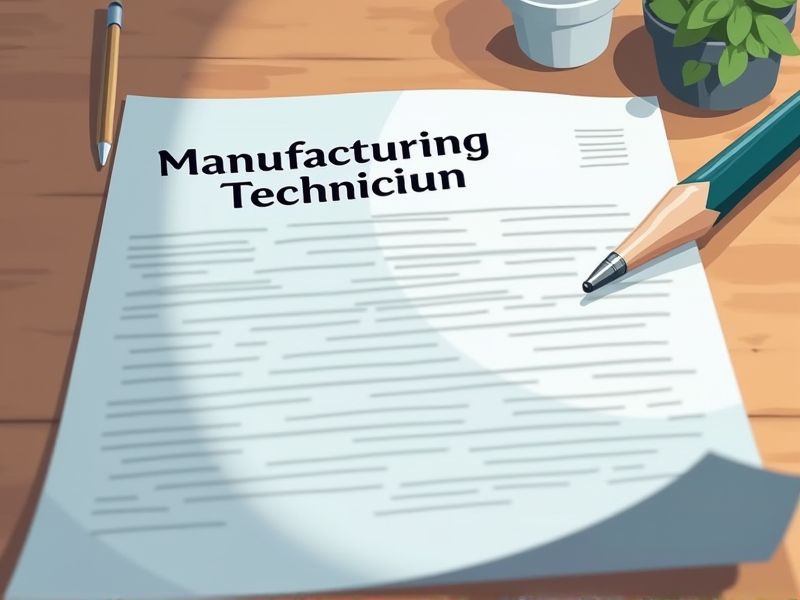
Manufacturing Technicians play a critical role in ensuring the smooth operation of production lines, requiring an understanding of complex machinery and processes. Certifications validate their skills and knowledge, ensuring they meet industry standards and can handle the technological demands of modern manufacturing environments. Specific certifications can enhance a technician's problem-solving abilities and safety compliance, which are crucial for maintaining high-quality production standards. Here are some important certifications you may need to become a proficient Manufacturing Technician.
Six Sigma Green Belt Certification
Six Sigma Green Belt Certification equips manufacturing technicians with essential skills in process improvement, leading to enhanced operational efficiency. This certification fosters a systematic approach to problem-solving, reducing defects and minimizing waste in manufacturing processes. Manufacturing technicians with Six Sigma training can better analyze data, improving product quality and customer satisfaction. The knowledge gained from this certification supports a culture of continuous improvement, which increases a company's competitive edge in the industry.
Lean Manufacturing Certification
Lean Manufacturing Certification is crucial for a Manufacturing Technician because it enhances process efficiency by eliminating waste and improving workflow. Certification equips technicians with skills to adapt to modern manufacturing challenges, thereby increasing their value to employers. It fosters a deep understanding of lean principles, promoting a culture of continual improvement within the production environment. This qualification can significantly improve job prospects and career advancement opportunities in the competitive manufacturing sector.
OSHA Safety Certification
OSHA Safety Certification enhances a manufacturing technician's understanding of workplace safety protocols, reducing the risk of accidents. By equipping technicians with this certification, companies can lower workplace injury rates, leading to fewer disruptions in production. A well-implemented safety program can also result in lower insurance premiums for the employer. Certified technicians contribute to a culture of safety, which boosts overall employee morale and productivity.
CNC Machining Certification
Having a CNC Machining Certification equips a manufacturing technician with the skills necessary to operate and program precision machinery effectively. Certified technicians typically contribute to higher production efficiency and reduced error rates in manufacturing processes. This certification often leads to better job prospects and higher earning potential within the competitive manufacturing industry. Many companies require certification to ensure adherence to industry standards and regulatory compliance.
ASQ Certified Quality Technician Certification
ASQ Certified Quality Technician Certification equips manufacturing technicians with enhanced problem-solving skills, leading to improved production efficiency. This certification validates a technician's ability to perform quality control functions, resulting in higher product consistency and reduced defects. Certified technicians possess specialized knowledge in quality inspection and testing, contributing to proactive maintenance and reduced downtime. Employers benefit from hiring certified quality technicians, as it demonstrates a commitment to quality standards and boosts the organization's reputation in the competitive market.
Electrical Safety Certification
Electrical safety certification ensures that manufacturing technicians are trained to work with electrical systems, thereby reducing the risk of accidents. When a technician holds such certification, it implies compliance with industry standards and regulations, leading to enhanced workplace safety. Certified technicians are better equipped to identify and mitigate potential electrical hazards, which can decrease downtime and improve productivity. Manufacturers often require certification to meet insurance and liability requirements, protecting both the technician and the company from potential legal issues.
PLC Programming Certification
PLC programming certification validates proficiency in designing, installing, and maintaining automated systems crucial for manufacturing efficiency. Certification equips technicians with standardized skills that improve troubleshooting capabilities, reducing machine downtime and maintenance costs. The absence of certification might result in inconsistent handling of systems, leading to operational inefficiencies. Companies often prefer certified technicians, increasing employment and advancement opportunities for those with formal qualifications.
Mechanical CAD Certification
Mechanical CAD certification equips manufacturing technicians with essential skills for creating and modifying precise digital designs, which leads to improved accuracy in production. As manufacturing processes increasingly incorporate automation and digital tools, technicians with CAD certification are better prepared to meet industry standards, thus enhancing their employability. Employers often seek certified individuals because they can reduce training costs and time by relying on candidates who already possess verified competencies. Certified technicians contribute to innovation and efficiency, as they are capable of optimizing designs for manufacturability, directly impacting the production timeline and cost-effectiveness.
Welding Certification
Welding certification ensures a manufacturing technician has the necessary skills and knowledge to perform welding tasks safely and effectively. It contributes to maintaining consistent quality in production processes, reducing the risk of errors and defects. Certified technicians are better equipped to adhere to industry standards and regulations, minimizing potential legal and safety issues. Employers often require certification to validate a technician's expertise, enhancing employment opportunities and career advancement.
Industrial Maintenance Certification
Industrial Maintenance Certification enhances a manufacturing technician's credibility by validating their skills in equipment upkeep and repair. With this certification, technicians can more effectively identify and resolve operational issues, leading to increased productivity and reduced downtime. Standardizing skills across the workforce through certification ensures consistent quality in repair and maintenance tasks. The certification also opens up more career advancement opportunities for technicians, increasing their value within the industry.
Summary
As a Manufacturing Technician, acquiring certifications can significantly enhance your skill set, leading to increased job opportunities. With these credentials, your ability to operate complex machinery and adhere to industry standards improves. This competence often results in higher productivity and efficiency within manufacturing processes. Consequently, employers may recognize your expertise with promotions or salary raises, increasing your professional value.
